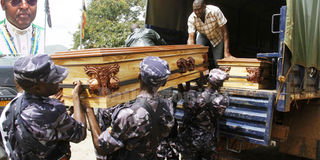Let’s be each other’s keeper

Police load caskets onto a truck following the raid on the palace of Rwenzururu King Charles Wesley Mumbere (inset) in 2016. PHOTO/ FILE
What you need to know:
- The issue: National identity and outlook.
- Our view: It doesn’t have to be about negative events only, because we have, in so many instances, triumphed as a country.
- We can clutch onto some of those collective unifying national aspirations too.
Like most of the tragedies that have befallen our country, November 26 and 27 passed quietly last week. The dates mark an assault by a joint force of the army and police when they attacked the palace of Rwenzururu king Charles Wesley Mumbere in Kasese Town.
The attack killed more than 100 people, including women and children. In the run up to the attacks, human rights report also say another 14 police officers were hacked to death by the kingdom paramilitary loyalists.
But five years later, justice for both victims remains elusive.
Similar tragic anniversaries were not marked for the victims of last year’s November killings, the 2011 walk-to-work protests, the Buganda riots of 2009, etc.
It, therefore, appears that as a country, we are engaged in collective forgetting and this has sad consequences for our country. How then do we learn from our tragic past when we choose not to remember them? How do we hope to walk away from such tragedies when we chose to ignore remembering such dark pasts and keep repeating them?
As metaphysical poet John Donne wrote, ‘No Man is an Island’, and we need to share in his wisdom that everyone of us is a piece of our nation, and any death of one of us diminishes us collectively. This is why our collective memories should be our shared representations of our country’s past based on our collective experiences of both pain and triumph.
Maurice Halbwachs, a French philosopher and sociologist, describes collective memories as a community’s shared renderings of the past that help shape its collective identity. A memory is considered collective when it is widely shared and when it helps to define and bind together a group.
In this regard, we’re not short of national events that we can cite, including the two-decade war in northern Uganda, the Kampala bombings of 2010, the walk to work protests of 2011 and many others.
Yet, these bleeding events pass quietly without any commemoration. Yet these major events should stir our collective memory whether at community, regional or national level.
Shouldn’t we, as a country or local communities, remember and mark these tragic plights?
But it should also be clear that we are not calling for extreme approaches given that many of our collective pasts are also divisive memories. Nevertheless, understanding our memory as a country will help us shape our national identity and outlook.
And, yes it doesn’t have to be about negative events only, because we have, in so many instances, triumphed as a country.
We can clutch onto some of those collective unifying national aspirations too.



